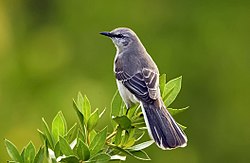Mockingbird
| Mockingbird | |
|---|---|
 |
|
|
Northern mockingbird Mimus polyglottos |
|
| Scientific classification | |
| Kingdom: | Animalia |
| Phylum: | Chordata |
| Class: | Aves |
| Order: | Passeriformes |
| Family: | Mimidae |
| Genera | |
Mockingbirds are a group of New World passerine birds from the Mimidae family. They are best known for the habit of some species mimicking the songs of other birds and the sounds of insects and amphibians, often loudly and in rapid succession. There are about 17 species in three genera. These do not appear to form a monophyletic lineage: Mimus and Nesomimus are quite closely related; their closest living relatives appear to be some thrashers, such as the sage thrasher. Melanotis is more distinct; it seems to represent a very ancient basal lineage of Mimidae.
Some types of mockingbirds are known to lay "alien eggs", or eggs that are laid in another bird's nest. Similar to the cowbird, the mockingbirds' offspring will force the other nest inhabitants from the nest, taking all the food from the parents and forcing the foster-parents to rear and fledge them.
The only mockingbird commonly found in North America is the northern mockingbird (Mimus polyglottos). The Greek word polyglottos means multiple languages.
Mimus:
Formerly Nesomimus (endemic to the Galapagos):
Melanotis:
When the survey voyage of HMS Beagle visited the Galápagos Islands in September to October 1835, the naturalist Charles Darwin noticed that the mockingbirds Mimus thenca differed from island to island, and were closely allied in appearance to mockingbirds on the South American mainland. Nearly a year later when writing up his notes on the return voyage he speculated that this, together with what he had been told about Galápagos tortoises, could undermine the doctrine of stability of species. This was his first recorded expression of his doubts about species being immutable, which led to his being convinced about the transmutation of species and hence evolution.
...
Wikipedia
